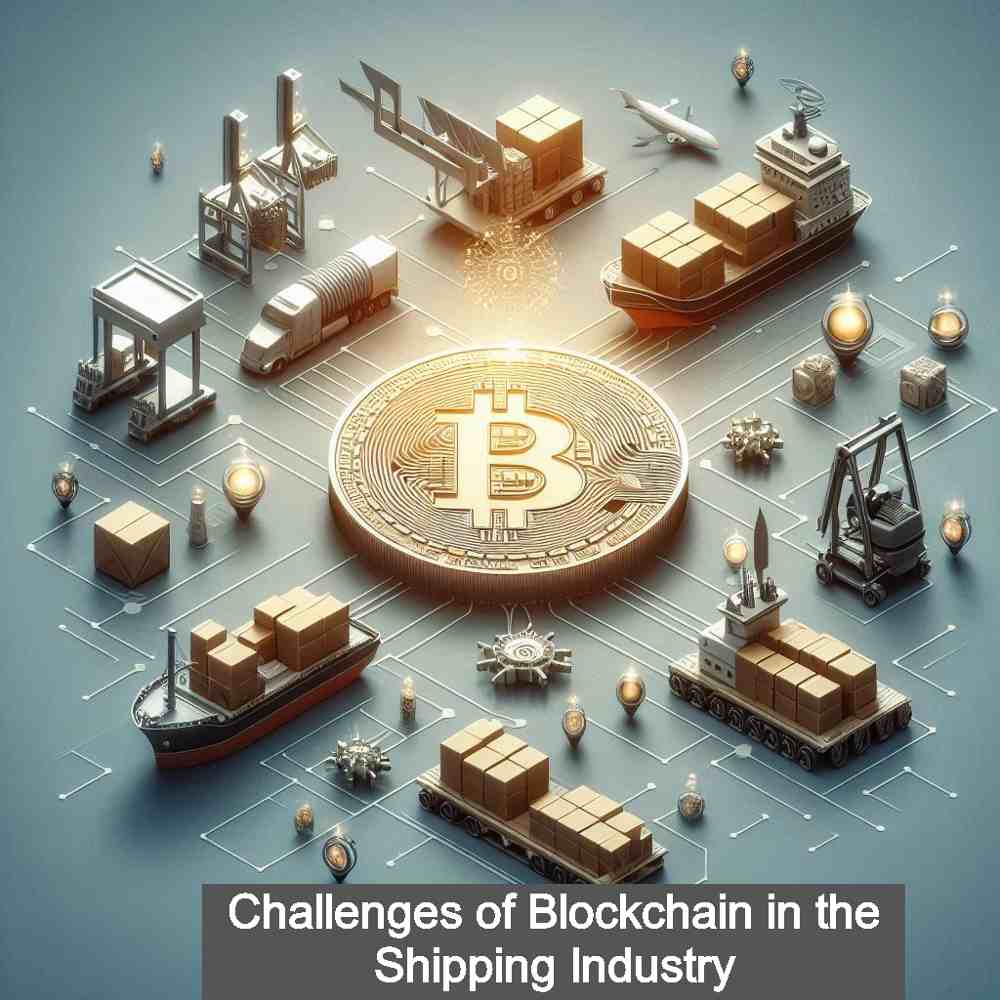
Dubai’s status as a global trade and logistics hub thrives on efficiency and innovation. However, traditional shipping processes are plagued by inefficiencies, from paper-heavy documentation to disputes over payments. This is where blockchain secured shipping emerges as a game-changer, offering a secure and transparent solution for the future. By leveraging blockchain technology, Dubai can streamline its shipping industry, reduce costs, and enhance collaboration across the entire supply chain.
What is indeed Blockchain and How does it work?
Blockchain technology may sound complex, but its core concept is quite straightforward. Imagine a digital ledger, like a record book, that’s not stored in one central location but rather distributed across a network of computers. This distributed ledger is where the magic happens.
Transactions are grouped into “blocks,” and each block is cryptographically linked to the one before it, creating a tamper-proof chain. This ensures the immutability of the data, meaning once information is recorded, it cannot be altered or deleted. This inherent security, along with other functionalities of blockchain, makes it a perfect fit for revolutionizing Dubai’s shipping industry.
Blockchain Secured Shipping: Revolutionizing the Industry
Blockchain technology is revolutionizing the shipping industry, introducing a new era of efficiency and security often referred to as “smart shipping.” Professionals across diverse industries are recognizing the transformative potential of blockchain and its future scope in streamlining shipping processes and enhancing overall operations.
Before delving into the advantages of blockchain in shipping, it’s essential to understand the existing challenges plaguing the shipping industry.
- Payment Disputes: The transportation industry grapples with significant payment disputes, tying up billions of dollars on a daily basis. On average, companies endure a lengthy wait of 42 days before receiving payment for issued invoices, leading to financial inefficiencies and operational disruptions.
- Rising Costs: The reliance on paper-based transactions incurs substantial processing and administration costs, comprising up to 20% of transportation’s overall expenses. Manual handling of documents, whether through email, fax, or post, slows down logistics and impedes trade facilitation.
- Complexity in Refrigerated Shipments: Refrigerated shipments entail intricate procedures involving numerous organizations and extensive communication channels. With over 30 organizations and 200+ communications required, any misstep in the process could result in delays or product loss, jeopardizing the integrity of the supply chain.
- Errors and Data Security Concerns: Payment mistakes and lost invoices are common occurrences in the shipping industry, leading to financial discrepancies and operational inefficiencies. Moreover, the risk of personal or classified data leakage due to human error poses significant security concerns.
How is Blockchain Beneficial to the Shipping Industry?
The shipping industry stands on the brink of transformation, propelled by blockchain technology. Just as it has revolutionized travel, banking, and various other sectors, blockchain is now poised to revolutionize shipping. Here’s how blockchain is set to reshape the landscape
- Slashing Costs: By automating tasks and eliminating paper trails and intermediaries, blockchain can significantly reduce expenses associated with manual labour, couriers, and bank fees, and even prevent fraud.
- Real-Time Communication for All: Open blockchain platforms foster streamlined communication across the industry. Stakeholders gain immediate access to live data, eliminating the need for time-consuming email and phone tags to retrieve information.
- Unmatched Security by Design: The decentralized nature of blockchain makes external hacking attempts nearly infeasible. Cryptographic safeguards protect data throughout its lifecycle, minimizing the risk of fraud and human error.
- Boosting Efficiency Across Operations: Blockchain streamlines numerous facets of maritime operations. It reduces manual workloads, enhances access to critical schedules, and expedites secure payments.
- Real-Time Visibility for Everyone: Information is no longer confined to a central location but is distributed securely across the network. Authorized users can access synchronized data in real time, regardless of their location.
Read More: How To Make Money From Blockchain Technology? 10 Incredible Ways
What are the Challenges of Blockchain in the Shipping Industry?

While blockchain offers a promising path forward, there are hurdles to address before widespread adoption becomes a reality.
- Integration Challenges: Many shipping companies rely on legacy systems and decentralized databases. Seamlessly integrating blockchain into these existing structures necessitates careful planning, collaboration with technology partners, and investment in solutions that ensure compatibility and a smooth transition.
- Scaling Up for Global Reach: Current blockchain technology might struggle to handle the massive volume of transactions inherent to global shipping operations. This can lead to performance bottlenecks and delays. Addressing scalability concerns requires the development of more efficient solutions like layer 2 protocols, sharding, and off-chain transactions.
- Balancing Security with Privacy: While blockchain boasts enhanced security through its decentralized ledger, data privacy remains a concern. Shipping companies must navigate data privacy regulations like GDPR and HIPAA when handling sensitive customer information, transaction records, and supply chain data. Implementing privacy-enhancing technologies can help address these concerns and ensure regulatory compliance.
- Standardization Hurdles: The lack of standardized protocols and compatibility between different blockchain platforms creates a roadblock for seamless data exchange and collaboration across the industry. Industry-wide cooperation and the development of common standards are crucial to overcome this obstacle.
- Regulatory Uncertainty Lingers: The legal landscape surrounding blockchain is still evolving, with different regulations emerging in various jurisdictions. This uncertainty poses a challenge for shipping companies, as they need to navigate complex legal and compliance requirements. Staying informed about regulatory developments and collaborating with relevant authorities are key to mitigating these risks.
Digitize your Luggage with Lifti
An innovative approach to delivery services is reshaping the landscape of travel and logistics, leveraging blockchain technology for unparalleled efficiency and security. Here’s how Lifti is digitizing luggage delivery to meet the evolving needs of travellers and shippers.
- Streamlined Process: Lifti, a luggage-sharing app, simplifies the process of shipping luggage by connecting travellers with senders through a user-friendly platform. Travellers list their available luggage space, including weight, destination, and travel dates, while senders place competitive bids for transportation.
- Secure Transactions: Lifti ensures secure and transparent transactions using blockchain technology. Payments are processed seamlessly through Lifti’s blockchain-based cryptocurrency method, offering peace of mind to both travellers and senders.
- Cost-Effective Solution: Lifti offers significant cost savings compared to traditional same-day delivery services, making it an attractive option for senders seeking affordable and eco-friendly delivery options.
- Real-Time Tracking: With Lifti, travellers and senders can track their shipments in real-time, ensuring timely and efficient delivery to their desired destinations.
Whether you’re a traveller looking to earn extra cash or a sender in need of swift and secure delivery, Lifti provides a revolutionary solution that combines convenience, affordability, and sustainability. Experience the future of travel and logistics with Lifti’s blockchain-powered delivery service. Get a comparison here.
Download App:
Frequently Asked Questions (FAQs)
How blockchain is revolutionizing the world of transportation and logistics?
Blockchain technology introduces smart contracts that streamline approvals and customs clearance processes, reducing processing times at customs checkpoints. By leveraging smart contracts, transportation and logistics companies can expedite the movement of goods, leading to increased efficiency and cost savings.
How blockchain technology is transforming the travel industry?
Blockchain technology is reshaping the travel industry by enhancing security and efficiency in booking and payment systems. It reduces fraud, improves customer loyalty programs, and ensures the authenticity of reviews and travel products. Through blockchain, the travel industry gains increased trust and transparency, fostering better customer experiences and industry growth.
Will blockchain speed up shipping?
Yes, blockchain technology has the potential to accelerate shipping processes significantly. By digitizing documents and enabling seamless data exchange throughout the shipping process, blockchain reduces paperwork and administrative overhead. This digital transformation results in a more efficient shipping system, facilitating faster and more reliable delivery of goods.
Why does blockchain take 3 days?
The 3-day holding period associated with blockchain transactions is designed to enhance security and protect users from fraud. During this period, transactions undergo verification and validation processes to ensure their integrity. This precautionary measure helps safeguard users’ funds in case of theft or loss of debit/credit cards, demonstrating blockchain’s commitment to maintaining trust and security in financial transactions.
Conclusion
In conclusion, the adoption of blockchain technology in the shipping industry holds immense potential for transforming traditional processes into streamlined, secure, and efficient operations. By embracing blockchain-secured shipping, Dubai and other global trade hubs can overcome the challenges of payment disputes, rising costs, and data security concerns. As the world moves towards a future of digitized logistics, the concept of Blockchain Secured Shipping stands at the forefront, paving the way for a new era of innovation and collaboration across the entire supply chain.



